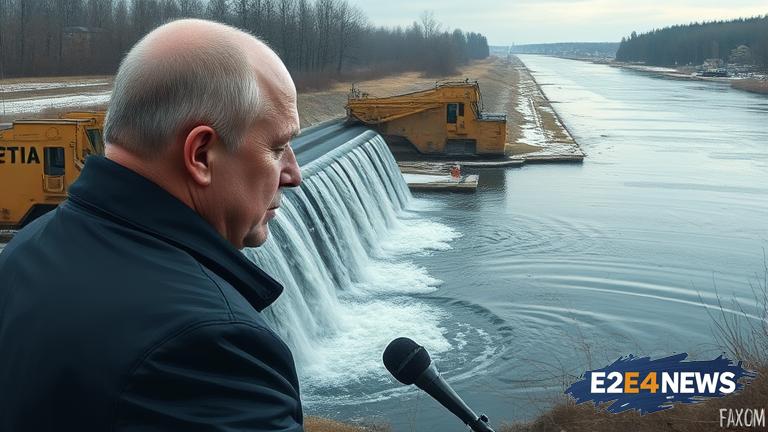The Russian-backed head of the Donetsk region, located in eastern Ukraine, has made a public plea to Moscow to take control of a vital canal that supplies water to the region. The canal, which is currently under Ukrainian control, is seen as a crucial lifeline for the region’s residents, who are struggling with a severe water crisis. The leader of the Donetsk region, Denis Pushilin, has stated that the capture of the canal is essential to alleviate the suffering of the region’s inhabitants. The water crisis in the region has been exacerbated by the ongoing conflict between Ukrainian government forces and Russian-backed separatists. The conflict has damaged critical infrastructure, including water treatment plants and pipes, leaving many without access to clean drinking water. The situation has become increasingly dire, with reports of residents being forced to rely on contaminated water sources, leading to a rise in water-borne illnesses. Pushilin has argued that the capture of the canal would allow for the restoration of the region’s water supply, providing much-needed relief to the affected population. However, Ukrainian officials have vowed to defend the canal, citing concerns over the potential consequences of allowing Russian-backed forces to gain control of the strategic waterway. The dispute over the canal has highlighted the complexities of the conflict in eastern Ukraine, where issues of sovereignty, territorial control, and resource management are deeply intertwined. The international community has called for a peaceful resolution to the conflict, with many urging all parties to prioritize the humanitarian needs of the affected population. Despite these efforts, the situation on the ground remains volatile, with ongoing clashes between Ukrainian government forces and Russian-backed separatists. The water crisis in the Donetsk region has also had significant economic and environmental implications, with many businesses and industries forced to shut down due to the lack of access to clean water. The region’s agricultural sector, which is a significant contributor to the local economy, has been particularly hard hit, with many farmers struggling to irrigate their crops. The environmental impact of the water crisis has also been significant, with reports of contaminated water sources and soil pollution. The situation has sparked concerns over the long-term sustainability of the region’s ecosystem, with many warning of the potential for irreversible damage if the crisis is not addressed. In response to the crisis, humanitarian organizations have launched efforts to provide emergency aid to the affected population, including the distribution of bottled water and water purification tablets. However, these efforts have been hindered by the ongoing conflict, with many aid convoys being blocked or delayed by fighting. The international community has condemned the actions of all parties involved in the conflict, calling for an immediate ceasefire and the resumption of peace talks. The situation in the Donetsk region remains a major concern for the international community, with many warning of the potential for further escalation and humanitarian catastrophe if the conflict is not brought under control. The Russian-backed leader of the Donetsk region has reiterated his call for Moscow to intervene, arguing that the capture of the canal is essential to preventing a humanitarian disaster. However, Ukrainian officials have remained resolute in their determination to defend the canal, citing concerns over the potential consequences of allowing Russian-backed forces to gain control of the strategic waterway. The dispute over the canal has highlighted the deep-seated tensions between Ukraine and Russia, with many warning of the potential for further escalation and conflict. The international community has urged all parties to prioritize the humanitarian needs of the affected population, calling for a peaceful resolution to the conflict and an end to the suffering of the people of the Donetsk region.
